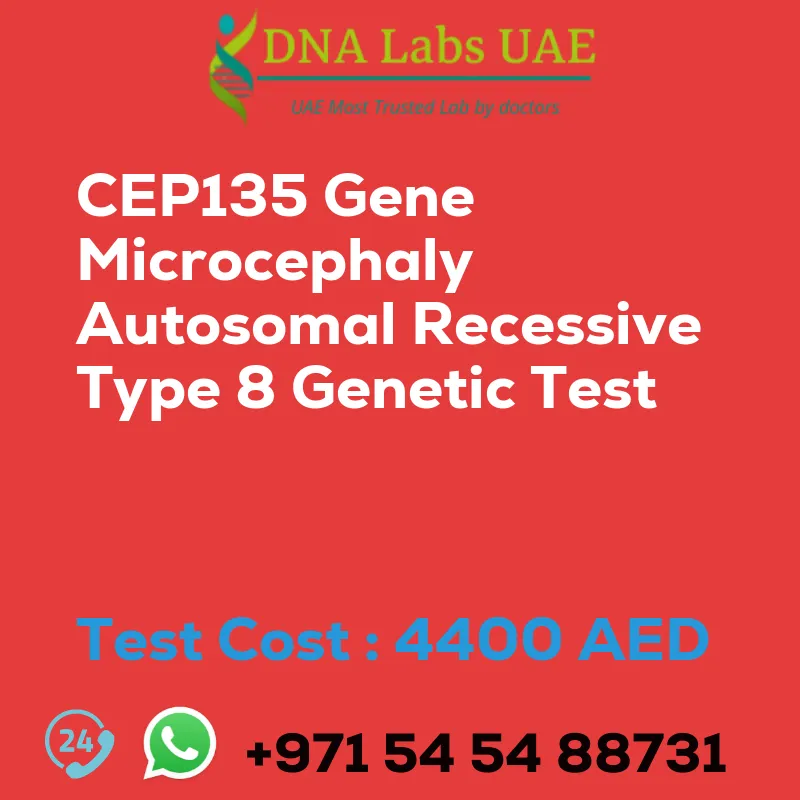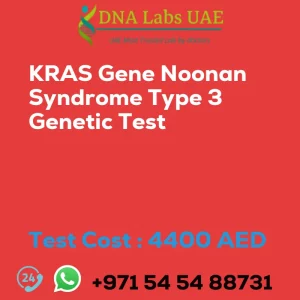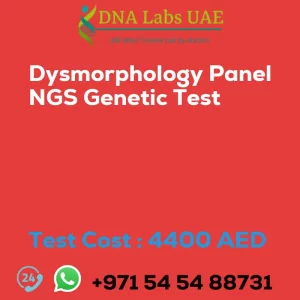CEP135 Gene Microcephaly Autosomal Recessive Type 8 Genetic Test
At DNA Labs UAE, we offer the CEP135 Gene Microcephaly Autosomal Recessive Type 8 Genetic Test to diagnose this specific form of microcephaly. Microcephaly is characterized by a significantly smaller head size and brain development. This type of microcephaly is caused by mutations in the CEP135 gene, which is involved in cell division and the regulation of centrosomes.
Test Components
- Price: 4400.0 AED
- Sample Condition: Blood or Extracted DNA or One drop Blood on FTA Card
- Report Delivery: 3 to 4 Weeks
- Method: NGS Technology
- Test Type: Dysmorphology
- Doctor: Pediatrics
- Test Department: Genetics
Pre Test Information
Before undergoing the CEP135 Gene Microcephaly Autosomal Recessive Type 8 Genetic Test, it is important to provide the clinical history of the patient. Additionally, a genetic counseling session will be conducted to draw a pedigree chart of family members affected with CEP135 Gene Microcephaly Autosomal Recessive Type 8 NGS Genetic DNA Test gene CEP135.
Test Details
The CEP135 gene microcephaly, autosomal recessive type 8 is a specific form of microcephaly. To diagnose this condition, a Next-Generation Sequencing (NGS) genetic test is performed. NGS is a high-throughput sequencing technology that allows for the simultaneous sequencing of multiple genes or the entire genome. In the case of microcephaly, NGS can identify mutations in the CEP135 gene associated with this specific type of microcephaly.
The NGS genetic test requires a DNA sample, typically obtained through a blood sample or saliva swab. The DNA is then sequenced using NGS technology, and the resulting data is analyzed to identify any mutations or variations in the CEP135 gene. If a mutation is found, it confirms the diagnosis of CEP135 gene microcephaly, autosomal recessive type 8.
Genetic testing for microcephaly can provide a definitive diagnosis and help guide treatment and management options. It is also useful for family planning purposes, as it determines the risk of passing on the condition to future children. However, it is important to consult with a healthcare professional or genetic counselor before undergoing genetic testing to fully understand the implications and limitations of the test, as well as the potential psychological and emotional impact of the results.
| Test Name | CEP135 Gene Microcephaly autosomal recessive type 8 Genetic Test |
|---|---|
| Components | |
| Price | 4400.0 AED |
| Sample Condition | Blood or Extracted DNA or One drop Blood on FTA Card |
| Report Delivery | 3 to 4 Weeks |
| Method | NGS Technology |
| Test type | Dysmorphology |
| Doctor | Pediatrics |
| Test Department: | Genetics |
| Pre Test Information | Clinical History of Patient who is going for CEP135 Gene Microcephaly, autosomal recessive type 8 NGS Genetic DNA Test. A Genetic Counselling session to draw a pedigree chart of family members affected with CEP135 Gene Microcephaly, autosomal recessive type 8 NGS Genetic DNA Test gene CEP135 |
| Test Details |
CEP135 gene microcephaly, autosomal recessive type 8 is a specific form of microcephaly, a condition characterized by a significantly smaller head size and brain development. This type of microcephaly is caused by mutations in the CEP135 gene, which is involved in cell division and the regulation of centrosomes. To diagnose CEP135 gene microcephaly, autosomal recessive type 8, a Next-Generation Sequencing (NGS) genetic test can be performed. NGS is a high-throughput sequencing technology that allows for the simultaneous sequencing of multiple genes or the entire genome. In the case of microcephaly, NGS can be used to identify mutations in the CEP135 gene that are associated with this specific type of microcephaly. The NGS genetic test involves obtaining a DNA sample, typically through a blood sample or saliva swab. The DNA is then sequenced using NGS technology, and the resulting data is analyzed to identify any mutations or variations in the CEP135 gene. If a mutation is found, it can confirm the diagnosis of CEP135 gene microcephaly, autosomal recessive type 8. Genetic testing can be beneficial for individuals with suspected microcephaly, as it can provide a definitive diagnosis and help guide treatment and management options. It can also be useful for family planning purposes, as it can determine the risk of passing on the condition to future children. It is important to consult with a healthcare professional or genetic counselor before undergoing genetic testing to fully understand the implications and limitations of the test, as well as the potential psychological and emotional impact of the results. |








